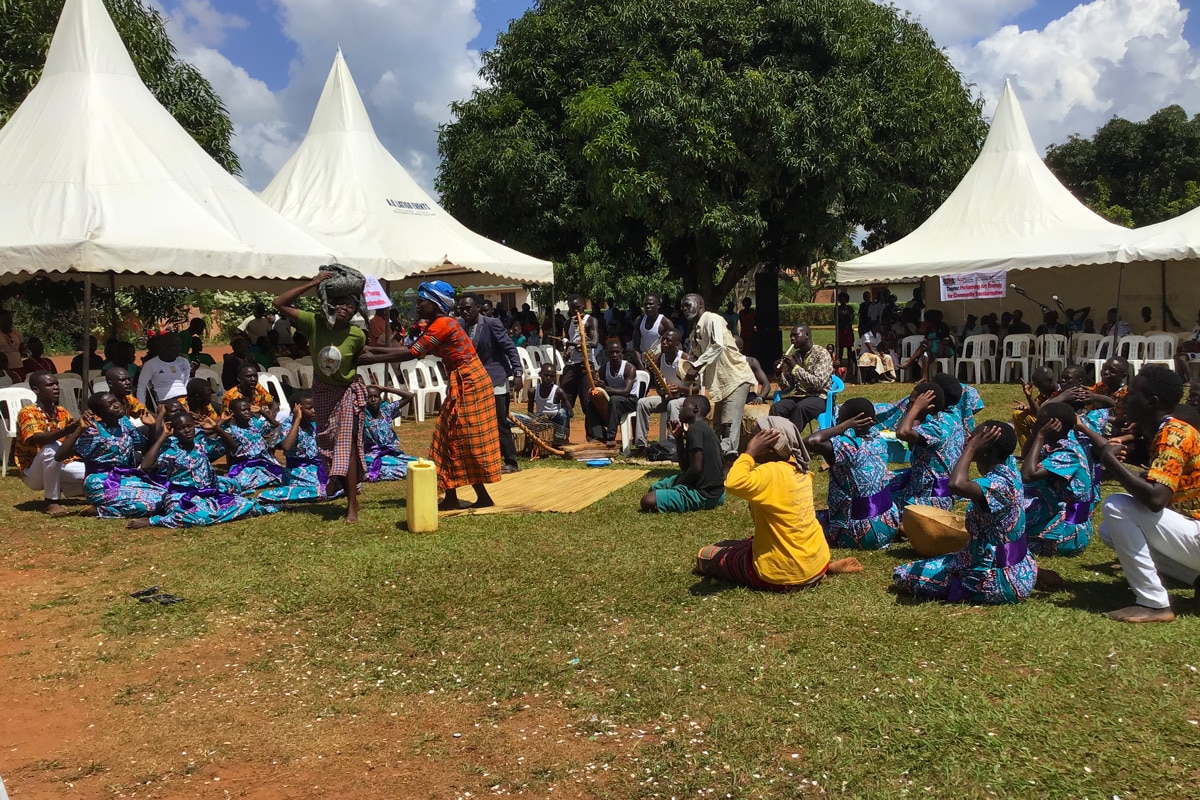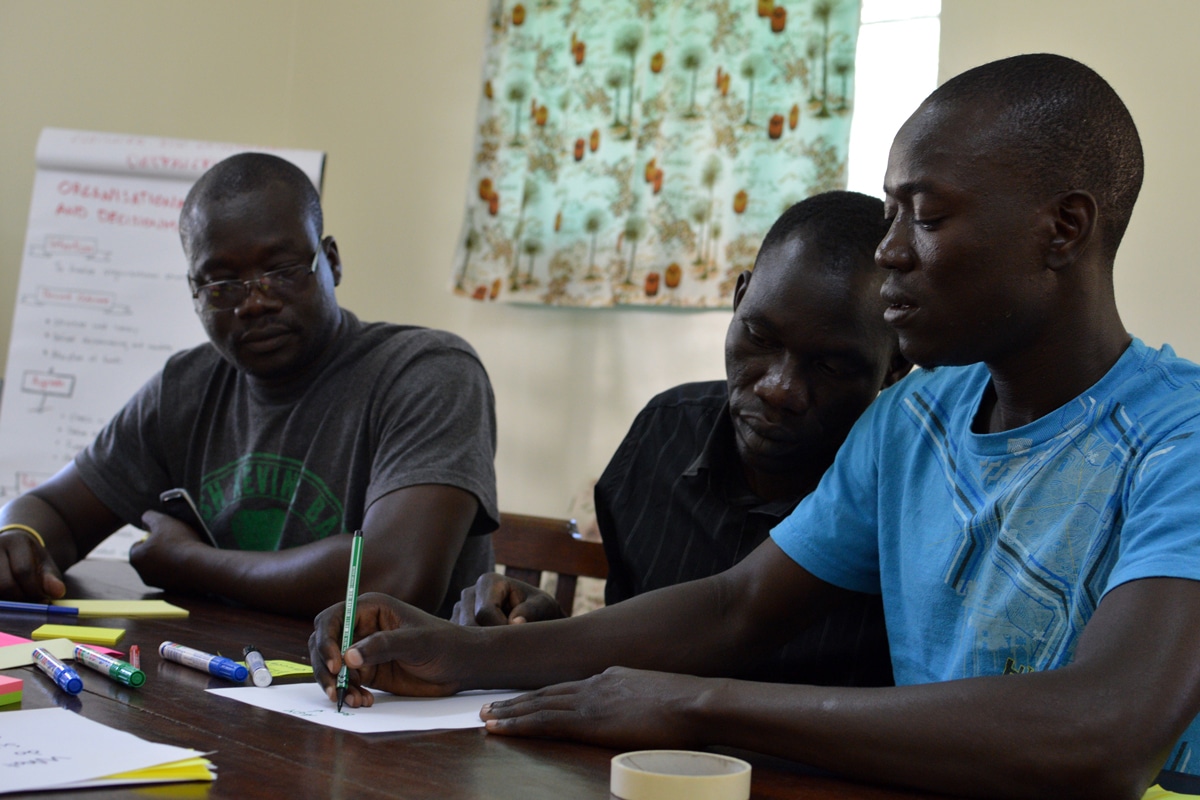YOLRED Hosts Annual Cultural Celebration to Promote Healing
By Geoffrey Omony, Goldin Global Fellow, Uganda
In Acholi, song and dance are fundamental parts of cultural heritage. They are used to retell important historical events as well as critique and pass on cultural knowledge from one generation to the next. With over 10 types of dances, the Acholi had a particular dance for almost every ceremony. They performed Bwola dance for the royals, Larakaraka and Ajere for courtship, Otole as war dance, and Myel Lyel for funerals. Other Acholi dances include Ayije, Dingidingi, Nanga, Acut, Okojo, Lacukucuku and Myel Jok. Apart from the dances, the Acholi also had a rich tradition of reconciliation (mato oput) which was widely used to settle misunderstandings and bring justice to the people.

However, this rich bank of cultural norms came to the verge of extinction due to the nearly two decades of insurgency in northern Uganda which disconnected families and limited space for cultural practices. The new generation of Acholi can barely sing, dance or perform any of the cultural norms, either because they don’t know how to do it or they have been caused to believe that those practices are evil and dirty.

But not all hope is lost as yet. Youth Leaders for Restoration and Development (YOLRED) is standing with the people to save their culture from extinction. Annually, YOLRED organises Community Festivals in which various groups of music, dance and drama artists gather to showcase their talents and compete for a prize. While these festivals are targeted at serving former victims of the Lord’s Resistance Army (LRA) as a form of therapy, they also help as platforms for exhibition of cultural dances, practices and promotion.

On December 18, YOLRED held the third and 2019 Community Festival at the Palm Gardens and Restaurant in Gulu, northern Uganda. At least four groups participated in the event, where they exhibited Bwola, Myel Lyel, Dingi-dingi and Aguma (Ayije) dances, instrumentals and drama with messages advocating for peace, reconciliation and ending of domestic, gender-based violence.
As early as 8 O'Clock in the morning, sections of the participants had already started trickling in to the venue with their instruments. Travelling aboard trucks, the artists carried with them large saucepans, drums, calabashes, bow harps, thumb pianos, animal skins, beads, bird feathers, among other instruments and costumes for their performances.

Soon, Local Council members, religious leaders, journalists, adjudicators, the Acholi cultural institution representative and spectators joined. The event started with welcome speeches from the chairperson, Local Council One and YOLRED leaders before the performances.
And when the artists finally stormed the stage, cheers, ululations and immeasurable excitement characterised the crowd. From the drama, to the instrumentals and the dances, all the teams showed high level of competition. For some reason, the crowd seemed not to get enough of the performances. They went into wild ululations, asking for more at the end of every performance. When the teams finally concluded, speaker after speaker showered them with praises.
“I am so glad that you are giving our people the chance to see and feel what the true Acholi culture is like. From what I saw today, I am encouraged today that the Acholi culture is not yet extinct. When I die, I want the kind of dance I saw here to be performed at my funeral, not the music systems that have dominated our ceremonies today,” Mrs. Rosalva Oywa, a social activist said.
Mrs. Poline Lukwai, the deputy Mayor of Gulu Municipality, said she was extremely excited by the unity, organisation and problem solving messages in the plays.
“I am so proud of you, YOLRED for picking up our culture and bringing it forward. This is a great challenge to our cultural institution and I want to ask the representative of the Ker Kwaro Acholi to go back and tell the Paramount Chief and his cabinet that this event that YOLRED has started needs to be supported in order to bring more people on board from all corners of Acholi,” Mrs. Lukwai said.
She urged the artists and everyone else in attendance to take serious the messages passed in the songs, dances and drama, and use them to ensure that peace reigns in society starting with their individual households.

Sheik Musa Khelil, the YOLRED's Patron, said culture is very important because it sets uniqueness and create identity of a people.
“A person without culture is like a bird which wings have been plucked. I am therefore, so happy that this event is fronting the Acholi culture. If only donors knew, and if only they could come and witness this event, they would know that YOLRED is the right organisation to be supported,” Sheik Kelil said.
The adjudicators, represented by Ms. Grace Aber, said the event revealed how rich the Acholi culture was, and also reminded people of the need to guard against and preserve the culture.
Mr. Emmanuel Ochora Lagedo, the deputy Prime Minister at the Ker Kwaro Acholi who represented the cultural institution, said while YOLRED said the Community Festival was meant for restoration of the Acholi culture, he viewed it as cultural development and not just restoration. “This programme is developing our culture, not just restoring it,” Lagedo said.

He said everyone in attendance had learned a lot from what they saw and he hoped that they would return home and reflect on whatever they were not doing right as far as the Acholi culture was concerned.
Mr. Geoffrey Omony, the YOLRED Programme Director, said as an organization, they were moved to start the programme by the need they saw, resulting from the nearly two decades of insurgency in northern Uganda that devastated both the people and their culture.
Mr. Omony said through the festivals, they identify groups that they subsequently support to economically empower the members, irrespective of their academic and social backgrounds.
He said while YOLRED is interested in bringing more groups to the festival, it is incapacitated financially. But they were hopeful that more groups would be brought on board someday.
The 2019 festival was held under the theme: Performing Art Therapy for Community Transformation.
This article was written by YOLRED's Douglas Olum who was formerly abducted and forcibly conscripted into the Lord’s Resistance Army.
YOLRED shares its deep appreciation to Arigatou International and the Goldin Institute's global network of supporters, especially Board member Thomas Hinshaw, for providing the support to make this annual celebration possible.
It is Never Too Late to Learn

YOLRED Host Celebration for 12 Never Late Graduates
Like the famous Chinese Proverb states: “A journey of a thousand miles begins with a single step.” On July 20, 2019, at least 21 women and men who were formerly abducted and forcibly conscripted into the Lord’s Resistance Army (LRA) rebel activities, started a journey to literacy when they enrolled for the “Never Late," adult literacy programme.
Under this five months, speedy learning programme, the learners, with the support of two volunteer primary school teachers, convened at Kirombe Primary School in Gulu Municipality, every Tuesday and Saturday to learn basic arithmetics, reading, writing and speaking skills.
While they yearned for arithmetical knowledge and admired people who spoke English Language near them, so little did they know that this journey would lead them to an equal height with their English speaking neighbours.
But five months down the road, they were in awe as they competently spoke and read in English.

It was all joy and excitement on December 18, 2019, when at least 11 women and a man, publicly unveiled their new learned skills at their graduation ceremony which also doubled as the YOLRED’s 2019 Community Festival day.
Donned in a T-shirt with the “Never Late Project” inscribed at the back, Oliver Grace Lanyero, in company of her colleagues, presented a poem in English titled, “War.”
War war war
I am the enemy of peace, security, education
War, where do you come from?
I come from nowhere
I am always there
When you are always there
You bring us suffering, poverty, famine, destruction, sickness and disease
Above all; violence to our rights
War war war
You made us to become uneducated
You destroy our lives and future
You make us hopeless, you make us homeless
You make us slaves of others
You make us medicine of sexual abuse
You make us child mothers
War war war
You go away
We don’t need you anymore
Enough is enough.
As they walked to the back stage, tears of joy rolled down some of their cheeks while they hugged each other in disbelief that they made it thus far.
“I now feel like a new person. This programme is very good because it has helped us to learn how to read and write. Such knowledge was something many of us did not have yet they are very important,” Lanyero said in an interview."
Mr. Francis Opobo, one of the volunteer teachers, said while many of the learners had no prior formal education background, he was so impressed by their level of commitment exhibited and ability to learn.
“Even while they had family commitments and many other individual challenges, they persistently attended the classes. It is true that some of them had to drop out due to reasons beyond their control. But I want to encourage that the training and learning should not stop here. There is so much that these people can still learn which will help them, their children and even the community they live in,” Mr. Opobo said.
Geoffrey Omony, the YOLRED Programme Director, said they came up with the “Never Late” project following requests from the former abductees to be equipped with such knowledge.
"Many times these people would go for public gatherings and when the registration form is brought, they had to look around for someone to help them write their names. This is a very sad and shaming experience for an adult person,” Omony said in an interview."
He said while the world could have thought that there was nothing good the former abductees could do, the December 18th graduation proved that these people were still capable of doing so much good to the world if given the chance and the right guidance.
The “Never Late” programme is a five months, rapid adult literacy project implemented by Youth Leaders for Restoration and Development (YOLRED) with support from Carlotta Ludovica Passerini, Arigatou International and the Goldin Institute.
This article was written by YOLRED's Douglas Olum who was formerly abducted and forcibly conscripted into the Lord’s Resistance Army.
Celebrating the First Anniversary of YOLRED

Greetings from Gulu, Uganda! On behalf of my colleagues here at Youth Leaders for Restoration and Development (YOLRED), I’m happy to share an update to our partners around the world.
Developing this report gave us a chance to reflect on the first anniversary of the launch of YOLRED that we celebrated in August. We have been reflecting on the relevancy of our programs and identifying what works well and what does not work well as a reintegration strategy for the war affected community. We hope that sharing our journey will help others who are working on issues affecting the former child combatants.
This attached report focuses on our activities of the past few months, but we will share a full report with the network at the end of the year. Watch the next newsletter for that report which will include information about a big event we are hosting in our community in Mid-December.
Thank you to our partners around the world who have been following the work of YOLRED. We hope you will share the work that YOLRED is in doing to directly address issues affecting ex-child-combatants. As the only organization designed and run by former combatants, YOLRED stands as an example that we returnees can contribute positively to our communities.

In the attached report, you will learn about our progress over the past few month in providing support to former combatants. The progress is hard-earned, as the young people we support face serious difficulties:
- Many children born in captivity have no trace of their family, and consequently no sense of identity or belonging.
- Many of these children do not go to school because their parents can’t pay fees or no parent to pay.
- Female ex-combatants are face additional stigma because of being associated with LRA atrocities and sexual abuse.
- There is a consistent low economic status for former combatants.
- Rejection and social stigmatization endure for returning fighters.

A participant in our programs, Lakot Jackline, sadly has to deal with many of these difficulties. Jackline was abducted as a child during the civil conflict with the LRA, but is now 39. The incredible trauma of her past and the stigma she faces today is compounded by her HIV positive status, making it very difficult to raise and care for her nine children.
Despite these difficulties, former combatants have made some great progress at the YOLRED center. She has benefitted greatly for our new music therapy programs which offers her a chance to heal and connect with others. In addition to Jackline, we recently helped two brothers who had been estranged to reconcile through our ESPERE forgiveness and reconciliation program.

In addition to our programs here in Gulu, I was able to share the tools and methods of YOLRED with a global audience this year. This spring, I travelled with my colleague Arach Janet to participate in the 5th International Forum of the Global Network of Religions for Children as part of a delegation led by Goldin Institute Founder Diane Goldin.
As the only organization designed and run by former combatants, YOLRED stands as an example that we returnees can contribute positively to our communities. Thank you to our partners around the world who have been following the work of YOLRED. We hope you will support and share the work that YOLRED is in doing to directly address issues affecting ex-child-combatants.
READ THE FULL REPORT
YOLRED: Now Open for Business

On behalf of my team here at YOLRED, I am proud to announce that we have opened our first official office in Gulu, Northern Uganda.

This is the latest exciting step in our journey and the achievement of a dream after the successful launch of the Youth Leaders for Restoration and Development (YOLRED) last fall. Our organization is the first organization in northern Uganda that is designed and run by former combatants and dedicated to serving and reintegrating our peers.
Before having our own space, we were previously limited to working at an array of restaurants around the Gulu community until the appropriate location could be found and secured. We now have a four room office located on a parcel of land 50x26 meters large. Although YOLRED is renting the property for now, rent is secured over the next seven months, through September of this year. Including a reception area, the YOLRED office accommodates our accounting, human resources and administration teams, as well as one large office space allotted for program team and community meetings.
Having our own office space is really a big accomplishment to both YOLRED and the community we serve. Now we have the security of having a space where we can plan, monitor, organize and meet. Other former combatants who are looking for support will now have a central and known place to come for help. My colleague Charles Okello put it best when he said:
"Now we are not seen as just a 'briefcase' organization that travels around to meet people where they are but also as an organization that is a safe space to visit. Its now easier for us to be visible to the national and international organizations that need to hear the perspective of former combatants".
Furthermore, having our own space will make it easier for us to operate efficiently and at a lower overall cost. Above all, having our own office is creating a great deal of good will with the community around us who can see a tangible display that we have a level of leadership, professionalism and support that many thought was impossible for former combatants.
Thank you to everyone who has helped us so far and we hope to welcome you in our new reception room if you travel to Gulu.
Former Child Soldiers in Uganda take the Lead
by Jimmie Briggs, Goldin Institute Board of Advisors
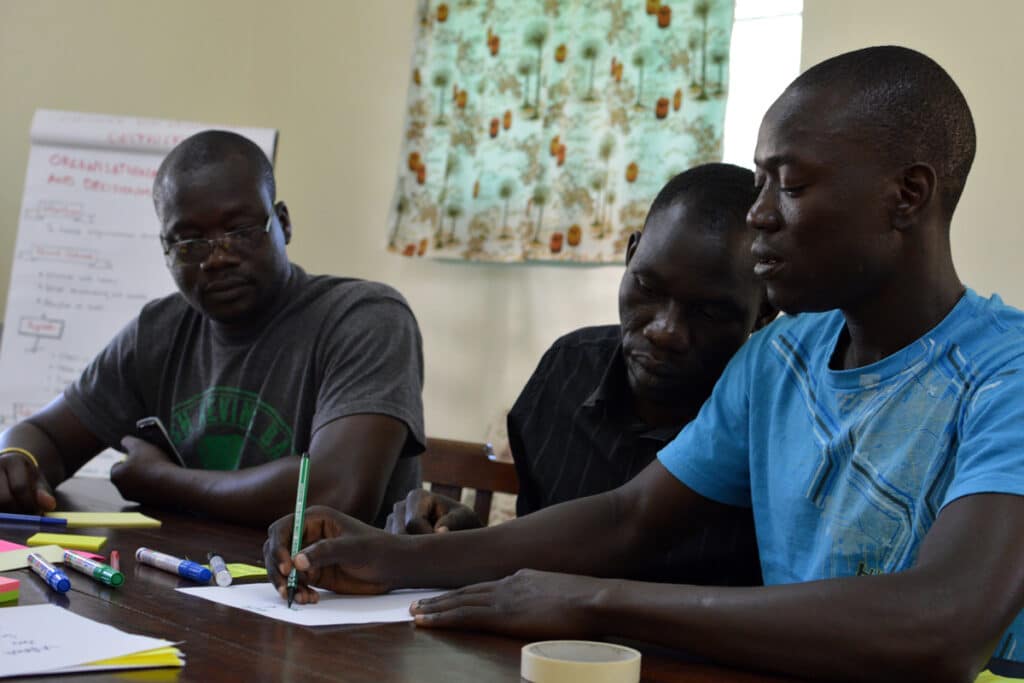
For nearly three decades starting in the late 1980’s, over 60,000 girls and boys in Northern Uganda were forcibly conscripted into fighting a guerilla war against their government, under the brutal domination of the Lord’s Resistance Army. In war that displaced 1.5 million people mainly of the Acholi ethnic group from communities such as Gulu and Kitgum, as well as the areas surrounding them, children bore an overwhelming weight not only as combatants, but also in carrying a stigma which has typically left them marginalized and overlooked as young adults today.
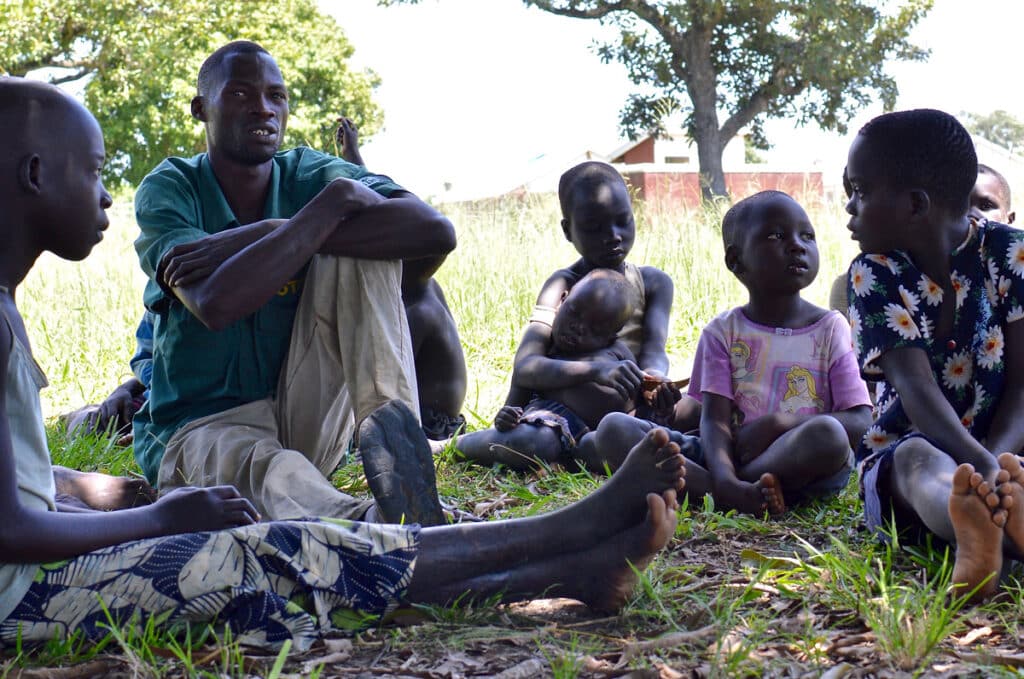
YOLRED, or the “Youth Leaders for Restoration and Development,” aims to address the challenges endured by former combatants with a key distinction which separates it from other well-meaning NGOs (non-governmental organizations) both local and international: YOLRED was founded by formerly abducted child soldiers to serve other young adults with the same shared experience. It is the only group of its kind to be designed, founded and led by members of the community which it serves.
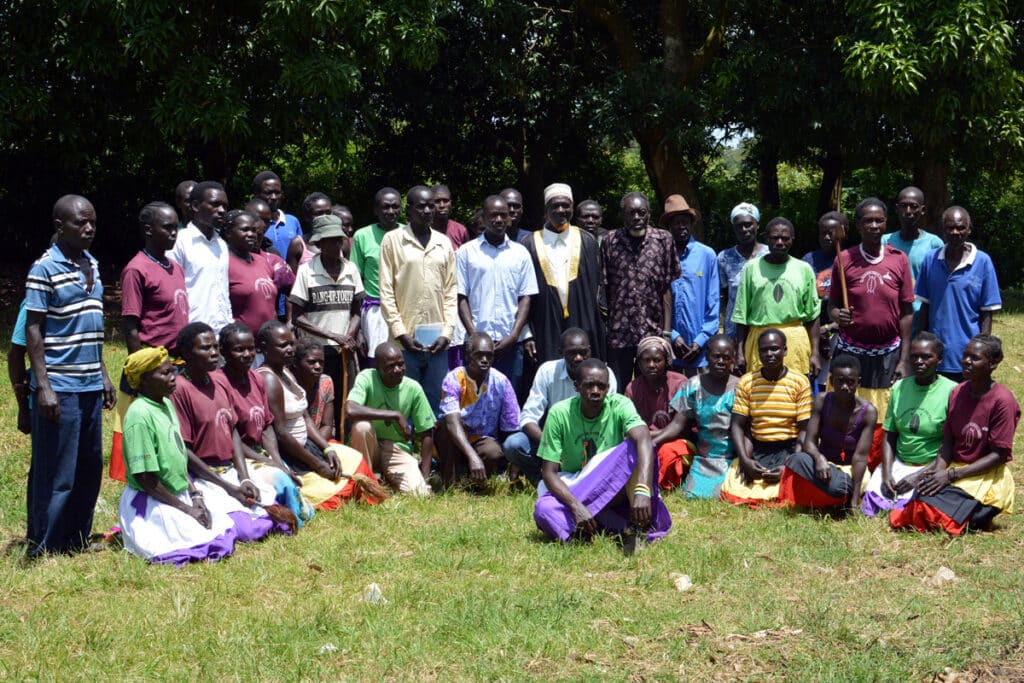
Its origins come out of mobilization of just under 200 former combatants from across Northern Uganda to capture and document oral testimony about their respective experiences in the civil war. Through a partnership with the Goldin Institute and local supporters, the core team of YOLRED led the effort to collect over 150 peer-to-peer interviews with former abductees about their experiences and insights.
Not unlike child soldiers in other countries who are undergoing the formal DDR (Disarmament, Demobilization and Reintegration) process without long-term support, many of those individuals who participated in the story collection project recounted being stigmatized, left homeless and struggling in poverty. The Goldin Institute in partnership with Arigatou International and Cartitas Counseling Training Institute worked with regional Ugandan leaders to support these child soldiers to assume agency and leadership over their own destinies.
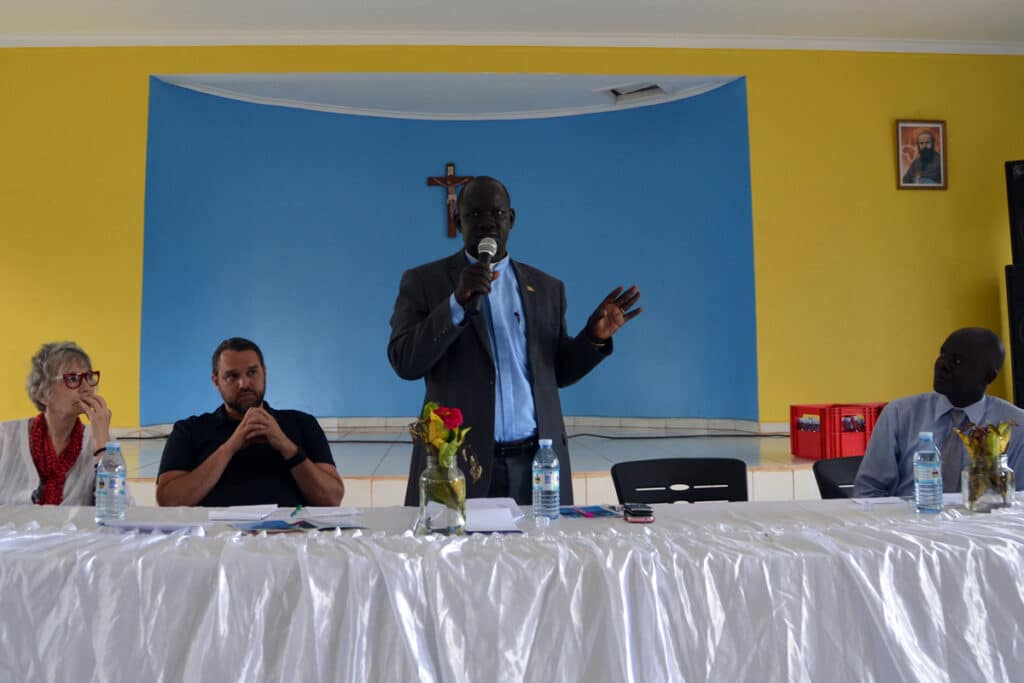
Equipped with this knowledge and the sense of solidarity developed through the research process, these community researchers produced the “Alone and Frightened” report to restore these voices to the conversation about reintegration and laid the foundation for an organization dedicated to achieving the aspirations of former combatants.
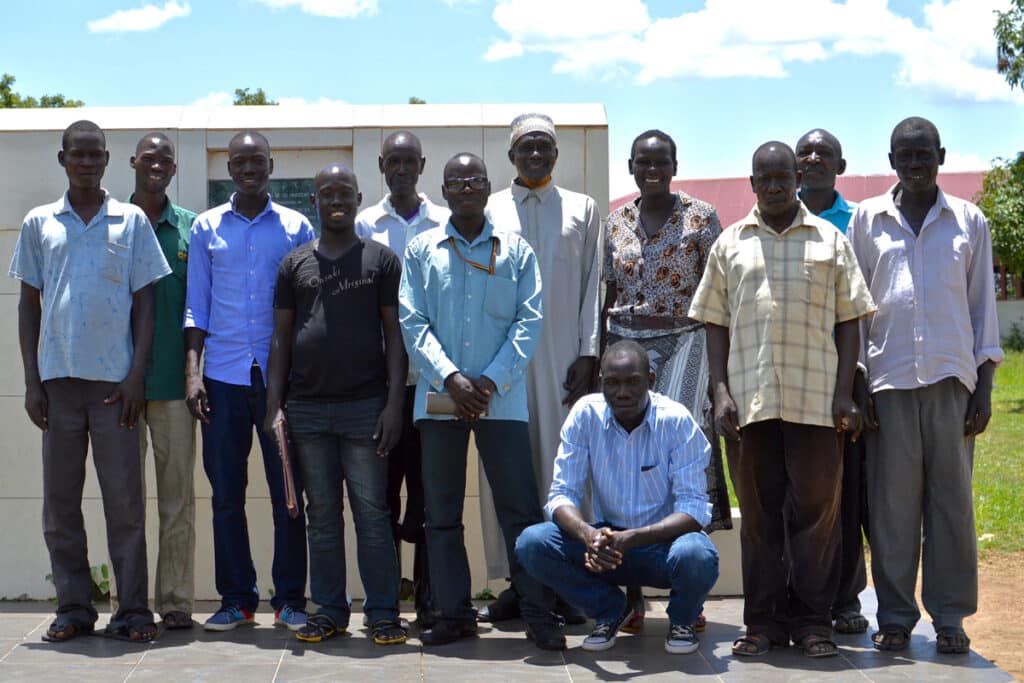
In a ceremony attended by partners from the Goldin Institute and a wide range of local partners, YOLRED was officially launched on August 27, 2016 in Gulu after years of careful planning, listening and outreach. YOLRED’s five co-founders – Geoffrey, Charles, Janet, David and Collins -- seek to support all young people who were impacted by the civil war, including ex-child soldiers, abductees, the displaced, the children of former abductees and child mothers throughout Northern Uganda. Indicators of well-being including health, education, employment and livelihood, as well as peace and security. The team is actively restoring the communities that were torn apart by the conflict and taking steps to prevent the abduction of children into conflict in the future.
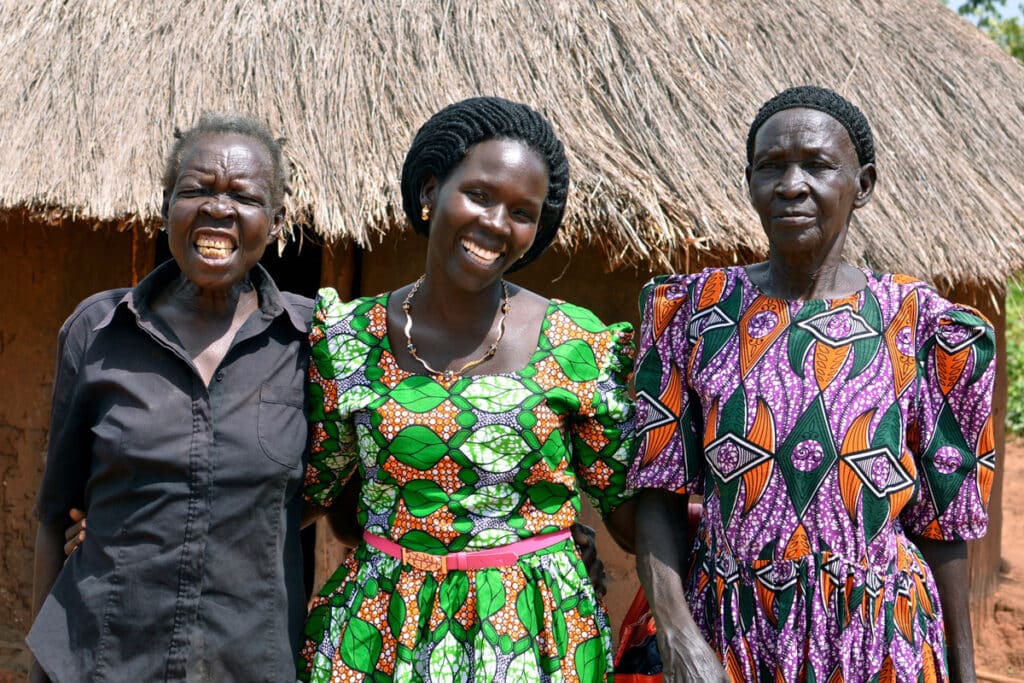
In preparing for the launch of YOLRED, the team partnered with the Goldin Institute, Arigatou International and Anorak who worked with YOLRED’s leadership to develop a five-year plan detailing its organizational structure and its primary initiatives including reconciliation, entrepreneurship and agriculture.
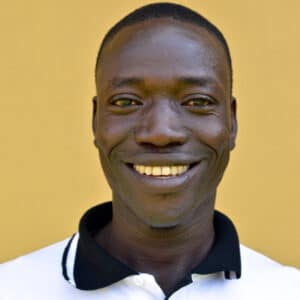
"I am happy for Youth Leaders for Restoration and Development, as a platform for former child soldiers. As a leader of the organization, I will [help] ensure that our problems and the solutions are implemented are locally. The output of this organization must be felt and seen in the communities." -- Geoffrey Omony, Co-Founder, YOLRED
Further, the credit union scheme is not only intended to provide low and no interest loans but also financial literacy for those without bank accounts nor a credit history. Grassoots entrepreneurs will be supported in their start-up efforts and encouraged to be peer mentors to others seeking to create businesses or authentic leadership in civil society and government. YOLRED will be critically evaluating all of its programming at key stages of its development.
Presently, the organization is applying for support from the IDEO Youth Empowerment Challenge, as well as Echoing Green for general operations as well as capacity building.
We invite you to learn more about YOLRED and how to get involved at www.yolred.org.
Follow Along as Former Child Soldiers Launch Reintegration Organization

August 27th Update:
I am pleased to announce that YOLRED, the first platform for Child soldier reintegration and rehabilitation in Africa that is owned and run by the former combatants themselves, is officially launched and up and running. Our work with the YOLRED team in Uganda ended with a public gathering to celebrate the official launch of the platform.
The team was able to share their vision with the public and was received with support from the community and different official stakeholders, NGO's and religious institutions. You can download the brochure that was distributed at the launch event here.
It has been an honour to see the fruit of over four years of hard work come to a big milestone, see the members of YOLRED rise and start to carry out a vision they have had on the inside for years. View our most up-to-date slideshow below:
[slide]
[img path="images/AnorakUganda010.jpg"]YOLRED Leaders Participate in Workshop on Strategic Planning[/img]
[img path="images/AnorakUganda011.jpg"]YOLRED Leaders Meet with Community Partners Throughout Gulu[/img]
[img path="images/AnorakUganda013.jpg"]YOLRED Leaders Participate in Workshop on Strategic Planning[/img]
[img path="images/AnorakUganda014.jpg"]YOLRED Leaders Participate in Workshop on Strategic Planning[/img]
[img path="images/AnorakUganda015.jpg"]YOLRED Leaders Meet with Community Partners Throughout Gulu[/img]
[img path="images/AnorakUganda016.jpg"]Anders from Team Anorak meets with Grassroots Community Leaders in Gulu[/img]
[img path="images/AnorakUganda017.jpg"]YOLRED Leaders Meet with Community Partners Throughout Gulu[/img]
[img path="images/Anorak_August2016/dianeG.jpg"]GI co-founder Diane Goldin meets with community leaders on the project[/img]
[img path="images/Anorak_August2016/w_danes.jpg"]YOLRED Leaders and ANORAK organizers, Morten and Anders enjoy casual moment for photo opportunity[/img]
[img path="images/Anorak_August2016/geoffery_work.jpg"]Team leader Geoffery meets with Grassroots Community Leaders in Gulu[/img]
[img path="images/Anorak_August2016/trav_trav.jpg"]GI Executive Director Travis Rejman with colleague Charles Okelo and family[/img]
[img path="images/Anorak_August2016/women_colors.jpg"]YOLRED participants display the local colors[/img]
[img path="images/Anorak_August2016/dianeG.jpg"]GI co-founder Diane Goldin meets with community leaders on the project[/img]
[img path="images/Anorak_August2016/w_danes.jpg"]YOLRED Leaders and ANORAK organizers, Morten and Anders enjoy casual moment for photo opportunity[/img]
[img path="images/Anorak_August2016/geoffery_work.jpg"]Team leader Geoffery meets with Grassroots Community Leaders in Gulu[/img]
[/slide]
Currently we are supporting the team in enacting their communications and outreach plan for both local and international supporters. In particular, we are providing some consultative support over the next two weeks to help them create their own website as an ongoing place of information and updates from YOLRED. Watch for an announcement in the next newsletter for the new website!
Now lies a lot of hard but exciting work for YOLRED, but with great support from the Goldin Institute, Arigatou International and wise partners on the ground, the team feels equipped and empowered, ready to reach out to their communities. We are very excited to follow the team’s progress in this coming period.
August 20th Update:
The Uganda team is working late hours these days with Team Anorak to be ready for the launch of YOLRED that will take place in only 6 days. The team is mobilising the community though many visits to local leaders and various sites in northern Uganda, they are also putting final touches on their leadership structure and preparing all the details for the launch next Saturday.
August 19th Update:
Along with my colleague Morten, I am pleased to share an update from our first week here in Gulu, Uganda with our partners from the emerging organization, Youth Leaders for Restoration and Development (YOLRED). We are inspired by the wisdom, creativity and passion that the former child soldiers of Uganda bring to the leadership of creating and managing their own organization. For the first time, former child soldiers themselves will determine their own strategies for reintegration and prevention.
To help finalize the organizational design, we have facilitated several workshops, helping the YOLRED team clarify and document the mission, vision and principles of this new organization.

We have also together made great progress in defining the organizational structure and plan to ensure that these young leaders will have the platform and support they need to acheive their ambitious mission.
These discussions with the YOLRED leaders have been informed by a wide range of key stakeholders including leading NGO’s, government offices, religious leaders and family members.

[block title="We can see the work over the past week has been crucial on two parallel levels" bg="#ce7019"]
First, through our conversations with community partners, we are raising awareness and enthusiasm among the stakeholders in the area. At the same time, this highly creative processes with the YOLRED team is designing solutuions to the missing pieces of their strategy and bringing a deep and inspiring cohesion and shared vision with the team.
[/block]
We look forward to keeping you updated as we move towards the public launch of YOLRED in the coming weeks.
If you have questions or suggestions, we're happy to hear for you.
Sincerely,
Anders and Morten, Team Anorak
A Call for Proper Justice

Our Executive Director, Travis Rejman recently wrote this editorial in the Huffington Post calling for the right justice to be considered in the case against Dominic Ongwen.
Ongwen has received international attention because of his role as a high-ranking soldier in Joseph Kony's Lords Resistance Army. To be sure, his crimes against humanity are not to be debated - as a leader within the LRA, Ongwen's actions were responsible for thousands of children and their families being killed, maimed and displaced. As Travis penned in his piece:
[quote]Major General Ongwen's roles in these atrocities is not in question. Demanding justice is not in question. The meaning of justice is."[/quote]
Because Travis co-authored the Huffington story with our longtime partner in Uganda, the retired Reverend Baker Ochola, the proper context was able to be provided on the nuanced meaning of what justice would be in this case, especially to those in the communities most impacted by Ongwen's actions. To many in these communities, Ongwen first and foremost was a victim himself in being abducted into the LRA as a child soldier.
The overwhelming call, especially by religious leaders in those communities, points to the desire for Dominic Ongwen to be returned to his homeland, where he can face justice at the hands of those most informed to determine what this will look like. To them, a faraway international court like the ICC is not the proper authority to prosecute and punish a former member of their own community. Read on for the full story at this link.
Update: Since the publication of the Rejman/Ochola piece in January, the International Criminal Court ruled that it would be holding over Dominic Ongwen for full trial at the Hague. We will continue to follow this story.
Alone and Frightened: A Summary of our Report
 In the discussions about disarmament, demobilization and reintegration of children used as soldiers in the conflict in Northern Uganda, the voices and perspectives of former child soldiers themselves have too often and too long been ignored.
In the discussions about disarmament, demobilization and reintegration of children used as soldiers in the conflict in Northern Uganda, the voices and perspectives of former child soldiers themselves have too often and too long been ignored.
To restore these voices to the discussion and to improve the services for former combatants, the Goldin Institute and local partners trained a group of former child soldiers in "Community Based Oral Testimony" as a tool for gathering these stories and perspectives. Through this project, former child soldiers themselves led the research collection through interviewing over 150 of their peers and together reflecting on common concerns and shared aspirations.
The results of this groundbreaking research are contained in the report, Alone and Frightened. Equipped with this knowledge and the sense of solidarity developed through the research process, the former child soldiers are now at the forefront of convening the National Platform for Child Soldier Reintegration in Uganda as a network for coordinating the work of NGOs, government agencies, religious communities and other partners who are working together to promote reconciliation and reintegration.
[quote]Child Soldier definition: A child soldier is one under the age of 18 and part of a regular or irregular armed force or armed group participation directly indirectly. Child soldiers perform a range of tasks including combat, laying mines, and explosives; scouting, spying, acting as decoys, couriers or guards; training, drill or other preparations; logistics and support functions, pottering, cooking and domestic labor; and sexual slavery or other recruitment for sexual purposes."[/quote]
- UNICEF 2003
 This study describes the state of children affected by the brutal war in Northern Uganda pitting the Lord's Resistance Army (LRA) against the Uganda People's Defense Forces (UPDF). These are stories of Former Child Soldiers (FCS), please use your discretion as these stories are both horrific and heart-rendering.
This study describes the state of children affected by the brutal war in Northern Uganda pitting the Lord's Resistance Army (LRA) against the Uganda People's Defense Forces (UPDF). These are stories of Former Child Soldiers (FCS), please use your discretion as these stories are both horrific and heart-rendering.
The study sought to achieve the following objectives:
- To facilitate a platform for FCS to share their experiences and challenges of abduction and escape from captivity.
- To establish the community and family perceptions and attitude towards FCS.
- To identify gaps in the implementation of the Cessation of Hostilities/Juba Peace Agreement (CHA) (2006), agenda item V on DDR, the institutional mechanisms and the current state of FCS with regard to DDR.
- To establish and highlight the locally-generated and FCS-based frameworks for reintegration.
- The content scope of this research was to document and analyze the experiences and challenges of FCS with regard to their reintegration into families and communities within the CHA broader agenda item V.
Design:
A total of 180 primary informants were purposely selected out of 264 interviewed using the principles of participatory feedback and primary respondent-centered ownership of the research. Of respondents, 52% were male, and 48% were female.
Key Findings:
Females seemed more unwilling to respond to the the participation due to fear of being identified, fear of community reprisal or, a manifestation of inadequate or lack of psycho-social support.
- The majority of children abducted (58.9%) were 15 years of age and below, a clear indication of loss of childhood including schooling for many, in addition to horrifying traumatic experiences.
- Major health issues were identified among FCS including bullet wounds and fragments in the body, septic wounds, fistula, HIV/AIDS and cardiac problems.The physical scars or bullets lodged in their bodies has rendered some of them unable to find spouses or fend for themselves.
- Of the 87 females interviewed, 39 returned as child mothers.
- While 60% of the abducted children found themselves in the hands of Uganda People's Defense Forces (UPDF) and later reception centers, many (40%) did not receive initial counseling and support. Many experienced constant death threats, spiritual initiation rituals ranging from sitting on dead bodies to having sex with an older person, lasting 1-6 years in captivity. Thus, one can understand the extreme levels of trauma and lack of livelihoods among FCS currently.
- Large portions of FCS expressed concerns of psychological suffering and/or trauma as a result of their experiences in captivity, including but not limited to, nightmares, anxiety and fits of anger, as well as alienation, appropriation, dispossession, guilt, loneliness, and poor relation with others (aggression, shouting, commanding, etc.).
- Over half found either one or both parents dead. This means a sizable number returned as orphans, with a greater number losing their fathers.
To learn more about the next steps and the multi-sector network promoting reintegration and reconciliation, click here to read about the work of the National Platform for Child Soldier Reintegration and Prevention in Uganda.
The following slideshow includes recent ESPERE workshops featuring our colleagues in Uganda and Kenya. Many of the participants represent the aspirations detailed in the Alone and Frightened Report.
[slide] [img path="images/slideshow/full/uganda2014_1.jpg"]Co-founder's Diane Goldin and Travis Rejman meet with Everest Okwonga, the Principal at St. Janani Luwum Vocational Training Centre[/img] [img path="images/slideshow/full/uganda2014_2.jpg"]Co-founder's Diane Goldin and Travis Rejman meet with students at a trade school for former child combatants in Gulu[/img] [img path="images/slideshow/full/uganda2014_3.jpg"]Co-founder Diane Goldin meets with students in a Gulu classroom during the Institute's June2014 trip to the region to take part on child soldier reintegration efforts[/img][img path="images/slideshow/full/uganda2014_4.jpg"]Participants of a workshop conducted by Global Associate Lissette Mateus Roa take part in one of the exercises teaching 'forgiveness'[/img][img path="images/slideshow/full/uganda2014_5.jpg"] Global Associate Lissette Mateus Roa (bottom left) and her group of ESPERE students. Also included is friend and colleague and Associate emeritus Dr. Dorcas Kiplagat (standing 5th from right)[/img] [img path="images/slideshow/full/uganda2014_6.jpg"]Participants of the ESPERE workshop during a training session[/img][img path="images/slideshow/full/uganda2014_7.jpg"]Global Associate Lissette Mateus Roa (standing) leads a training session in Gulu[/img][img path="images/slideshow/full/uganda2014_9.jpg"]Global Associate Lissette Mateus conducts an exercise with participants of the ESPERE workshop in June 2014[/img][img path="images/slideshow/full/uganda2014_15.jpg"]Global Associate Lissette Mateus (sitting foreground) leads her ESPERE training group[/img][img path="images/slideshow/full/uganda2014_28.jpg"]Co-founder Diane Goldin meets with students at the St Janani Vocational School. The School is made up of mostly former child soldiers learning new skills (like carpentry in this classroom) to rejoin civilian life.[/img] [img path="images/slideshow/full/uganda2014_27.jpg"]The workshop attended by former child combatants[/img][img path="images/slideshow/full/uganda2014_34.jpg"]Institute co-founder Diane Goldin meets with Ajok Dorah - a psychologist specializing in giving counsel to former child combatants returning to their communities.[/img][/slide]
Colombia Brings Reconciliation Methods to Uganda
In the tradition of the Goldin Institute's Forgiveness and Reconciliation Project, and utilizing the ESPERE methodology developed with our colleagues in Colombia, our efforts towards building child soldier reintegration continues throughout Northern Uganda.
As our Global Associate on the ground in Uganda (Denis Okello) recently reported to us in this summary paper, both Kitgum and Amuru districts have suffered greatly from armed violence and conflict. The instability in the area results in the ongoing recruitment and coercion of countless adults and children into the rebel forces. As Denis tells it, "in some way or capacity, each and every household in Northern Uganda has suffered the direct effects of the conflict in terms of abduction, death, displacement, poverty or illness." Against this backdrop, both districts serve as ideal communities to workshop the methods of ESPERE, bringing effective training to those within the community wishing to cope with the effects of war – and also those hoping to better their lives.
 In the Kitgum District, Denis' report focused on a workshop conducted specifically for secondary and vocational school teachers. Here, educators could be equipped with the knowledge and skills on the process of forgiveness and reconciliation in order for them to effectively respond to the needs of their students who have been directly impacted by the civil war that they have grown up in.
In the Kitgum District, Denis' report focused on a workshop conducted specifically for secondary and vocational school teachers. Here, educators could be equipped with the knowledge and skills on the process of forgiveness and reconciliation in order for them to effectively respond to the needs of their students who have been directly impacted by the civil war that they have grown up in.
In the Amuru District, Denis overviewed the specific training to former child combatants, young mothers, and orphaned young adults of the conflict who have been left to become the 'heads' of their households. Denis provided the history and background, and explained that within Amuru, the sub-county of Pabbo was one of the first and largest camps for Internally Displaced People (IDPs) during the LRA War between 1986 and 2006. After the end of hostilities in 2006, the displaced persons, former combatants, victims of atrocities and children born from captivity within the LRA, flooded back to many parts of Pabbo. It is important to point out that Denis and his own family have been impacted by the conflict's history and because of his training directly from our Global Associate Lissette Mateus Roa, was uniquely qualified to be one of the three facilitators of Amuru Workshop.
Workshops Follow Ongoing Committment to the Issue of Child Soldiers
The trainings held by Denis and his team on the ground in both Kitgum and Amuru Districts, would not have been possible without prior research conducted in Northern Uganda with former child soldiers. Released late last year, we published the guide, Alone and Frightened, to provide first-hand accounts and experiential stories of former child soldiers affected by the brutal war pitting the Lord's Resistance Army (LRA) against the Uganda People's Defense Forces (UPDF). Our extensive research with our partners in the region (including our former Global Associate from Kenya, Dr. Dorcas Kipligat, who served as the Project Coordinator to the report), provides an ongoing resource guide to all new workshops being conducted in Africa.
Readers familiar with the origins of the ESPERE methodology, will remember that it is made up several modules reinforcing the two phases of forgiveness and reconciliation. A link to an early version of what this looked liked as it was piloted in Colombia can be found here. The slideshow that we have put together at the end of this story is remarkable in the consistencies between the exercises in Latin America and those taking place to make up the workshops in Uganda.
We are excited to see from the expansion of the project from Latin America to East Africa, how in spite of the cultural, ethnic and societal differences between two unique continents and their people, the methods being shared for forgiveness and reconciliation are held in common. What we are learning in facilitating these trainings is the universal nature of how most all people impacted by conflict have the capacity to embrace these methods. Please follow along in the narrative slideshow below to see this happening in Kitgum and Amuru.
